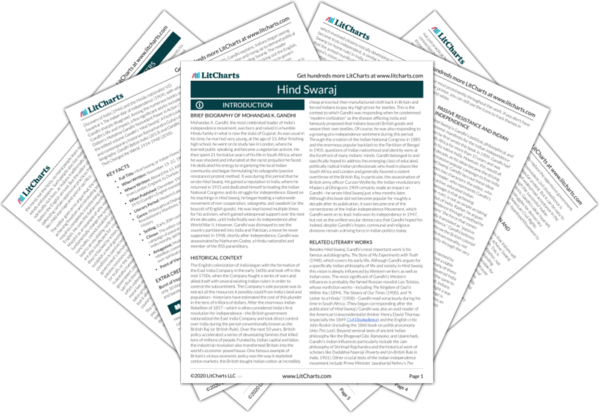Swaraj Quotes in Hind Swaraj
You are impatient. I cannot afford to be likewise. If you will bear with me for a while, I think you will find that you will obtain what you want. Remember the old proverb that the tree does not grow in one day. The fact that you have checked me, and that you do not want to hear about the well-wishers of India, shows that, for you at any rate, Home Rule is yet far away. If we had many like you, we would never make any advance. This thought is worthy of your attention.

Unlock explanations and citation info for this and every other Hind Swaraj quote.
Plus so much more...
Get LitCharts A+The same rule holds good for the English as for the Indians. I can never subscribe to the statement that all Englishmen are bad. Many Englishmen desire Home Rule for India. That the English people are somewhat more selfish than others is true, but that does not prove that every Englishman is bad. We who seek justice will have to do justice to others. Sir William does not wish ill to India—that should be enough for us. As we proceed, you will see that, if we act justly, India will be sooner free. You will see, too, that, if we shun every Englishman as an enemy, Home Rule will be delayed. But if we are just to them, we shall receive their support in our progress towards the goal.
You have well drawn the picture. In effect it means this: that we want English rule without the Englishman. You want the tiger's nature, but not the tiger; that is to say, you would make India English, and, when it becomes English, it will be called not Hindustan but Englistan. This is not the Swaraj that I want.
A nation with a constitution like this is fitter to teach others than to learn from others. This nation had courts, lawyers and doctors, but they were all within bounds. Everybody knew that these professions were not particularly superior; moreover, these vakils and vaids did not rob people; they were considered people's dependants, not their masters. Justice was tolerably fair. The ordinary rule was to avoid courts. There were no touts to lure people into them. This evil, too, was noticeable only in and around capitals. The common people lived independently, and followed their agricultural occupation. They enjoyed true Home Rule.
If we become free, India is free. And in this thought you have a definition of Swaraj. It is Swaraj when we learn to rule ourselves.
1. Real home-rule is self-rule or self-control.
2. The way to it is passive resistance: that is soul-force or love-force.
3. In order to exert this force, Swadeshi in every sense is necessary.
4. What we want to do should be done, not because we object to the English or that we want to retaliate, but because it is our duty to do so. Thus, supposing that the English remove the salt-tax, restore our money, give the highest posts to Indians, withdraw the English troops, we shall certainly not use their machine-made goods, nor use the English language, nor many of their industries. It is worth noting that these things are, in their nature, harmful; hence we do not want them. I bear no enmity towards the English, but I do towards their civilisation.












